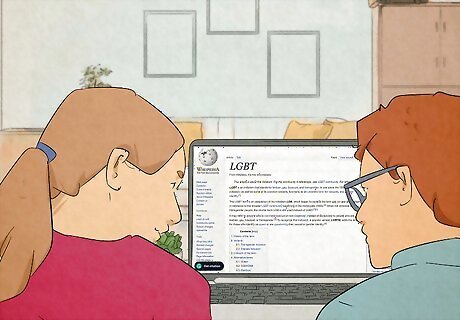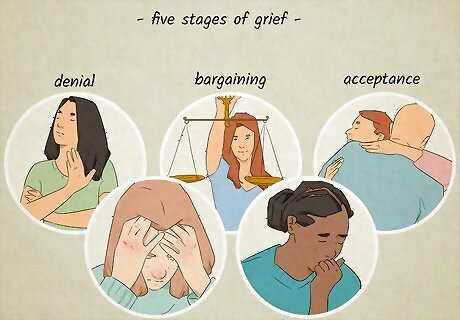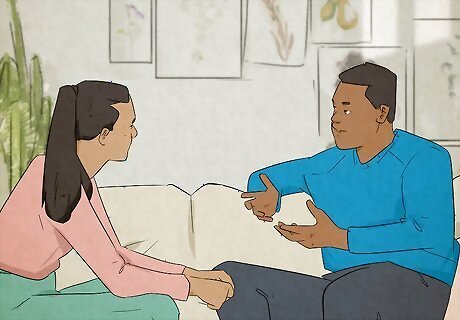
views
Figuring Out Your Approach

Examine your motivation. Before initiating such an important conversation, take some time to think about why you want to have this discussion with your parents. Is it because you are secure in your sexuality and confident that you want to live your life openly? Or are you feeling angry, resentful, and overwhelmed? If you are upset or angry, then it may not be the most appropriate time to share this information. There are many reasons why you might choose to come out. It is up to you as an individual to decide when it is a good time and when there is a good reason. For instance, maybe you are very close to your parents and you don't like the distance that keeping a secret creates between all of you. Avoid coming out because of anger. Remember, your sexuality is not a weapon to be used to upset anyone. If you feel that the only result will be a hateful response, consider waiting to have this talk.

Think about risks and benefits. Consider your living situation. Do you depend on your parents for housing and necessities such as food? Or do they pay your college tuition? Think about the possible consequences of coming out. You want to feel very confident that your parents will continue to support you despite your gayness. If you are worried about being kicked out of your home, consider waiting to come out until you are financially independent. Consider your safety. Are you scared that one or both of your parents may become violent? Make sure you have a plan to get to a safe space if that occurs. One strategy is to identify a friend who can provide a safe place for you to go if the conversation with your parents does not go well. This space can also give your parents time to reflect on the conversation so you can have a follow-up conversation. You also want to think about the possible benefits of coming out. For example, this could make your relationship with your parents much stronger. You might also feel emotionally better and a huge relief knowing that you don't have to keep your sexual identity a secret. EXPERT TIP Lauren Urban, LCSW Lauren Urban, LCSW Licensed Psychotherapist Lauren Urban is a licensed psychotherapist in Brooklyn, New York, with over 13 years of therapy experience working with children, families, couples, and individuals. She received her Masters in Social Work from Hunter College in 2006, and specializes in working with the LGBTQIA community and with clients in recovery or considering recovery for drug and alcohol use. Lauren Urban, LCSW Lauren Urban, LCSW Licensed Psychotherapist Prioritize your own health. Psychotherapist Lauren Urban adds: "If you’re in full control over how and when you come out to your parents, prioritize your physical and emotional safety over the need to come out. You may want to wait to come out if: you feel unsafe, you live at home, or you don't have control over your own circumstances. If you do come out while living at home, be sure to have a backup plan in the event that your family’s response is negative."

Consider different scenarios. Try having a variety of plans ready. For example, if your parents are open to listening to you, figure out exactly how much you want to share. Or, if your parents are angry, what will you do? Will you give them space? Will you talk to another trusted family member, friend or relative? Make sure that, whatever you decide, you are respectful and understand it may take your parents some time to absorb what you've told them. Make a plan in case your parents are not supportive. Are you prepared to cut off contact with them? Do you have a safe place to stay, if necessary? If your parents request space, or if they no longer seem to be hearing you, don't press the issue. This may increase the stress and tension in the moment. Try to set an agreed-upon date and time to have a follow-up conversation. Your parents may not be able to process any more information until they can fully absorb what you have already shared.

Find an ally. Preparing to come out can be a really emotional experience. It is perfectly normal to feel anxious or even scared. Having a good support system can be really helpful in this situation. Before coming out to your parents, make sure that you have at least one ally. Maybe you've already come out to one or more close friends. Ask them to support you before and after your talk with your parents. You can also seek support from your college or community's LGBT support center. Anyone that you really trust can be an ally for you. Talk to the person about your plan to come out to your parents. Find someone in your support group who is willing to let you stay with them if things do not go well during the discussion.

Organize your thoughts. This is an important conversation so it is a good idea to be as prepared as possible. Try writing down what you want to say before you actually have the discussion. You can even make note cards to keep with you. They can help you to make sure that you have said everything you want to say. Try practicing with a friend or relative. They can help you figure out the right words. Try to figure out, at the very least, what you want to use as your opening line. You might say, "Mom and Dad, I have something to tell you. Please listen to me with an open heart and an open mind."

Choose the right time and place. Your parents might be very surprised by your news. Try not to startle them even more by telling them your story as they are on their way out the door to work, for instance. Instead, look for a time where your parents are relaxed and able to give you their full attention. It's also important to choose the right place. In many cases, it might be best to do this in private. Your living room might be a good choice. If you have any concerns about your safety, though, a public place might be a better choice. You could consider a coffee shop. Or you could go to a relative's house if they are supportive of you.
Communicating Effectively

Be direct. When you're nervous, it can be tempting to dance around the subject. However, it is important to make your point clear early in the conversation. Otherwise, your parents might grow confused or frustrated. A good opening line could be, "Do you two have time to talk? I have something important to tell you about my sexuality." You might also choose to wait until you are actually sitting down to talk and say, "I want to let you know that I am gay. I hope that you can support me in being who I am."

Show empathy. Coming out is an emotional experience for you. Try to understand that your parents might be feeling emotional, too. For example, if your dad cries, don't immediately take that as a sign of rejection. He's allowed to process emotions, too. If your mom says she needs time to think, allow her some space. There is a difference between showing empathy and letting people hurt you. If there is any kind of abuse in response to what you've shared (such as insults or verbal abuse), walk away. If you have made arrangements with a supportive friend or family member, go to their house so they can help you through this difficult time.

Actively listen. The best conversations are ones in which everyone contributes and participates. Obviously, you have a lot you want to tell your parents. But remember that they deserve a chance to speak, too. Show that you are willing to listen. Maintain eye contact. You can also avoid defensive postures, such as crossing your arms.

Remain calm. In most cases, this will be a very emotional conversation. And remember, it is completely fine to show your emotions. However, remember that you might make more progress if you are able to do so calmly. Instead of yelling, "Why won't you listen to me!?" try calmly saying, "It makes me feel frustrated when you keep interrupting me." Try taking a deep breath before speaking. It's also fine to take a little time to think about what you want to say next before speaking.

Keep the conversation on your terms. This is your news and you want to feel in control of the situation. Remember, your parents do not have the right to verbally abuse you. If you find yourself being shamed or yelled at, you can end the conversation. You can say, "I understand this is emotional for you, but I will not listen to these hateful words. Please let me know if you would like to continue this conversation when you calm down."
Moving Forward After Coming Out

Provide resources. It's possible that your parents might not know much about what it means to be gay and the process of coming out. You can help them to understand by giving them some helpful information. Offer resources from credible sources. Print out some information to have on-hand during the discussion. Your parents will be processing a lot of information during this discussion, and it may be difficult for them to remember the names of organizations, web addresses, or information you share. Have these available in a hard copy so that your parents can read the material when they've had some time to think about the conversation. Among the printed materials you may want to provide the website for PFLAG, which is an organization that help families and friends learn to be supportive of those who identify as LGBT. Additionally, you could provide them with the number or website for the LGBT center on your campus or in your community. They will likely have helpful facts for your parents.

Understand the stages of reaction. It would be ideal if your parents immediately reacted in a positive, supportive way. However, it might take them a while to reach that place. Many people will go through different stages of emotion. Knowing that ahead of time can help you to deal with that. Your parents may grieve, which is completely normal. They may have had a vision of who you are or what your future will be like; grieving means they're coming to terms with the loss of this vision. The five stages of grief are denial, anger, bargaining, depression, and eventually acceptance, but they don't have to happen in any particular order. Understand that grieving is very personal, and you can't predict how long your parents will be in any one stage of the process. Grief is also not linear, meaning they may go forwards and backwards, they may experience multiple stages at once, or they may skip over certain stages entirely. You may be going through a grieving process yourself during this time, over your parents' reaction and your fear of losing the relationship.

Keep lines of communication open. However the conversation ends, try to leave the door open for future talks. Tell your parents that you all need some time to process your emotions, but that you hope you can talk again soon. If your parents were verbally abusive, you do not need to feel bad about closing the conversation. Remember that no one has the right to make you feel bad about who you are. Ask your parents if they would be open to attending family counseling/therapy. Look for someone with experience with LGBTQ issues. A mediator can help keep communication clear and respectful.

Build a support system. Whether or not your parents support you, it is important that you find a circle of people that you can count on. Look for friends and relatives you can trust, and turn to then when you need support. You can also find support at your campus or community LBGT center. Your community might also have some LGBT friendly churches where you can go and find new sources of support.


















Comments
0 comment